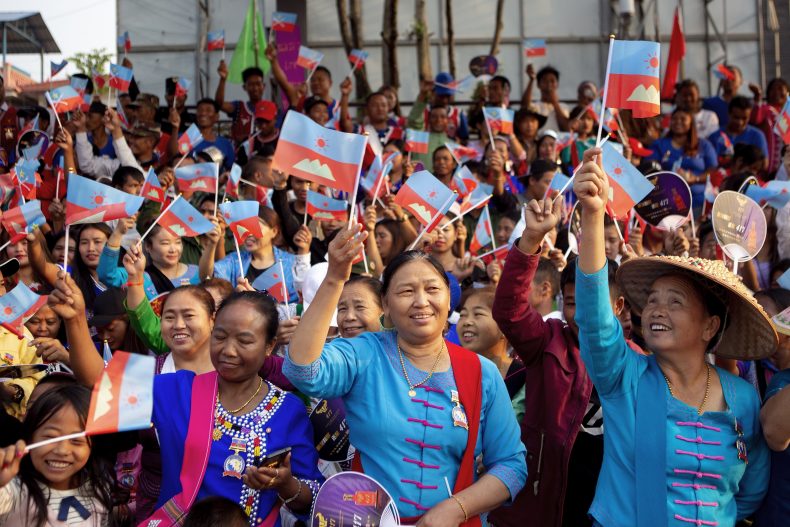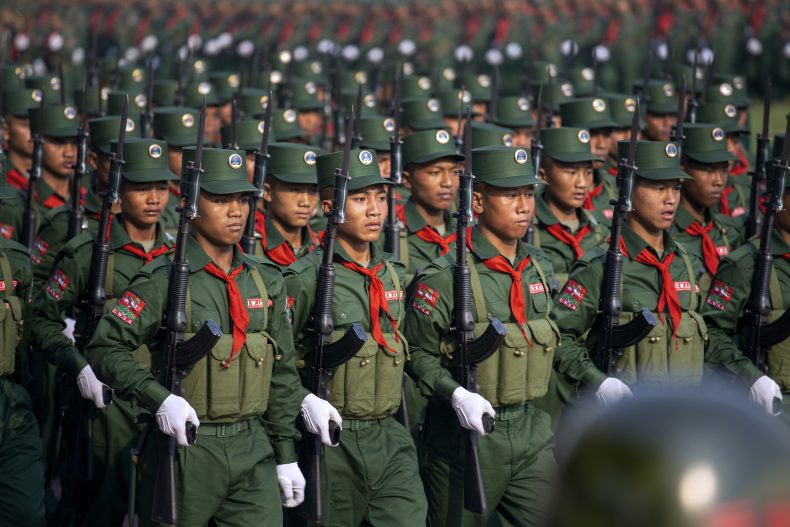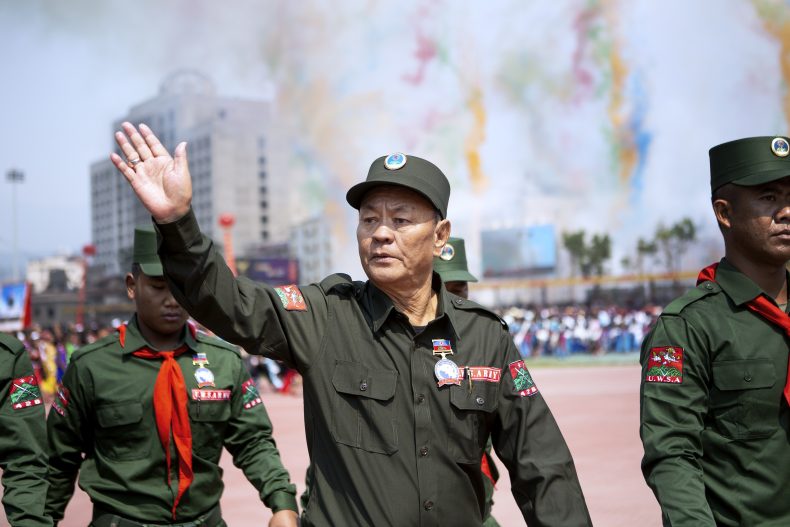PANGKHAM, WA STATE. MYANMAR — “Nothing is sure here, everything is changing. Everything here is temporary. You don’t have a certificate, you don’t have anything official. You need to stand on your feet in order to be able to survive here.”
These words exemplify the reality many ethnic Wa face in Pangkham, the capital of Wa state in northern Myanmar. Unrecognized by the Burmese government except as a “special region,” Wa state is roughly the size of Belgium. Largely without Myanmar ID cards but determinately not Chinese, the ethnic Wa have long inhabited the mountains that divide China’s Yunnan province and eastern Myanmar and for years were seen as key players in the region’s opium cultivation and trade. Wa state is home to the United Wa State Party (UWSA), the largest non-state armed group in East Asia, which occupies a critical mediating role in China-Myanmar relations.
April 17, 2019 marked the 30th anniversary of an internal coup within the Communist Party of Burma (CPB) by the Wa, the ethnic majority within the party ranks, an event which led to the formation of the UWSA. To mark this occasion, the Wa held a three-day celebration, and invited foreign observers and journalists to the Pangkham as part of an ongoing process to open to the outside world and improve their international image.

Spectators celebrate 30 years of peace between the United Wa State Army and the Burmese military on April 17, 2019 in Pangkham. Photo by Bryan Dickie.
During three days of festivities, the Wa projected a vision of autonomy that focused on a combination of military might and a reinvigoration of Wa cultural identity among a rapid influx of Chinese cultural and political influence. The commander-in-chief of the UWSA, Bao Youxiang, reasserted Wa state’s demands for confederate status as an officially recognized autonomous state within the Union of Myanmar. That approach is at odds with the Nationwide Ceasefire Agreement (NCA), the peace process supported by Western governments and favored by the Myanmar government, but which has been deadlocked for years. For the Wa, signing the NCA would be a significant step backwards from their current 1989 ceasefire agreement with the government, which has proven to be lucrative, enabling the UWSA near-complete autonomy from Myanmar while allowing them to leverage their geographic position straddling the border with China.
Myanmar’s democratically elected leader, Aung San Suu Kyi, who declined the UWSA’s invitation to attend the glitzy Pangkham celebration, has proven as ineffective as her predecessor, former General Thein Sein, at moving the stalled national peace process forward. Continuing to ignore the UWSA’s demands to recognize what the group calls Wa state, which to the UWSA also includes a second section the group seized from Khun Sa along the Thai border in the late 1990s at the behest of the then-ruling military regime, could have serious implications for the Lady.
A cursory glance at the daily economy in Pangkham shows what would appear to be starkly different sides of Wa state. This prosperous city with clean streets and large hotels exists at the margin of both China and Myanmar, with development projects and new roads beyond the scope of Naypyidaw’s vision yet also distinctly influenced by the Chinese. There are market stalls selling produce, shops selling cheap Chinese garments, and shopkeepers trading their wares. There is also a thriving illicit economy, which includes endangered wildlife trade, the pink glint of late-night massage parlors-cum-brothels, and large casinos and luxury hotels.
China’s rapprochement with Wa state leadership and their financial and cultural ties have led some to call Wa state a “shanzhai” China. “Shanzhai” is a Mandarin-language term now used to refer to counterfeit consumer goods, yet it literally translates to mountain stronghold or village, derived from stories of hidden treasures amassed by mountain warlords. Paradoxically, it is the mountainous territory that had long protected the Wa from the reaches of large centralized states, until the the Chinese communist army and Burmese army moved into the Wa hills in the 1950s, and the CPB conquered the area in 1971 and ‘72. While many analysists have claimed that the Wa’s recent military strengthening is due solely to Chinese influence, it is clear that much of this strategy emerged in the aftermath of the purge of Khin Nyunt, the Burmese chief of intelligence and the Wa’s main ally in Burmese government and the military. One senior Wa official explained of the Wa-Chinese relationship: “We’re brothers, we’ve always been connected, we have a long-standing relationship — but we still desire autonomy.”

Wa soldiers march in parade formation to mark the 30th Peace Anniversary held in the Wa State capitol, Pangkham, on April 17, 2019. Photo by Bryan Dickie.
While Maoist militarism permeates local culture and Chinese language signs adorn the streets of Pangkham, during the anniversary activities, Chairman Bao Youxiang stressed that the Wa are more then a vassal state of China.
Is it in part because of the nature of the Wa’s influence — as brokers between China and other ethnic armed groups in Myanmar — that the Burmese seek for them to be vilified and forgotten?
“The Burmese government do not want foreigners to know about the Wa. They just want to keep them staying alone,” one Wa villager, who asked to remain unnamed, said. “The government should be understanding. Because we have long been neglected.” The comment highlights the tenuous nature of life for the Wa, a pariah within a country often overlooked in the West.
Whispers of malevolent puppet-masters and Chinese overlords have mystified the Wa and diminish their culture and history to one of subservience to outside forces. The Wa believe themselves to be the original inhabitants of their land, and with an Austroasiatic culture and language, they may have arrived here tens of thousands of years ago. Yet the Wa people have long been exoticized, both in the colonial imagination and in the minds of the Burmese and Chinese, who have seen them as dangerous “others.” A mythos of savage headhunting clings to the Wa to this day. Selectively sensationalistic accounts of Wa state have also strengthened the perceived divide between the Wa and their Burmese counterparts.
The Wa are eager to shed their reputation as drug warlords, to lift the veil of secrecy that these hills have harbored and outsiders have fostered over the last few hundred years. While economic growth precipitated by the drug trade is undoubtably central to the successes of Wa state, the Wa are keen to stress alternative forms of development moving forwards. Without this, the Wa are aware that everything they have built may indeed be temporary. Bao Youxiang has aligned himself with an anti-drug agenda, with an opium eradication program largely eliminating the crop by 2005. Still, Western governments remain suspicious of the Wa, who have been pegged by analysts in the past as the largest drug producers in Asia. Experts claim opium has simply been replaced by more profitable and centralized methamphetamine production.
Methamphetamine production has supposedly furthered the centralization of assets, while eliminating the traditional opium-based tributes as a form of taxation that had long been present in the region. Opium taxation had some benefits, in so far that local farmers could subsist while paying taxes in the form of a crop they already cultivated, bringing the market directly to the farmer rather then forcing farmers to compete with the rapidly declining prices of Chinese produce and other products such as rubber.
Interestingly, the recent 2018 Myanmar Opium Survey released by the UN Office on Drugs and Crime (UNODC) has rightly faced harsh criticism from ethnic armed opposition organizations, as it made countless errors that mistook government-backed militias for other ethnic armed groups such as the Kachin Independence Organization (KIO) and Shan State Army South (SSA-S). Whether the UWSA-s more recent economic pursuits — including tin mining to such a scale that they flooded the world market and heavy involvement in Myanmar’s highly lucrative jade trade — are any more ethical than previous method of raising funds is a pertinent question.

United Wa State Army Chairman Bao Youxiang waves to the crowd as he exits the 30th Anniversary Peace celebrations held on April 17, 2019 in Pangkham. Photo by Bryan Dickie.
In his speech, Bao highlighted a new vision of development, praising Wa state’s achievements of establishing a market economy and “opening up to the outside world.” This idea of opening up to the world is increasingly important to Wa elites, who stress that their existence is not merely one of precarious coexistence between states, but rather an emphasis on the autonomy and cultural diversity of the region. As one unnamed local explained, “In 1989 everyone called us rebels. But now the Wa can assert that they are an ethnic group in their own right within Myanmar, that they share some aspects of our culture, and that people can visit here.”
However, economic development is very much a work-in-progress. As an influential Wa figure who also asked to remain unnamed explained: “We don’t have educational support, like high-schools. I think we should have a college, or some kind of training center that can refresh our minds. It is not ideal that people are just joining the military.” Many Wa face forced conscription and unpaid military service alongside inadequate education provision and healthcare services, while the knock-on effects of opium eradication have had profound effects on the livelihoods of the rural farmers that form the majority of the population of Wa state.
Balancing the ambitious vision of the future projected by the Wa leadership with the harsh realities of daily life is something that the Wa must come to terms with moving into the future. While the leadership has aged, the children and relatives of many in the leadership ranks have had the benefits of being sheltered from these realities, often being educated abroad. They are now returning home with a more progressive global vision for the future of Wa state.
Ultimately, as Bao Youxiang declared, “The Wa people are masters of their own destiny at this important point in history.” For the Wa, de facto statehood has already been achieved. They are at a juncture where they have to navigate increasing regional and international pressure to maintain their autonomy, and desire a more stable chapter of international relations, where they are more open to the world, have both rights within the Union of Myanmar while also maintaining the autonomy they have long cherished.
Dominique Dillabough-Lefebvre is a researcher and Ph.D. student in anthropology at the London School of Economics.

































